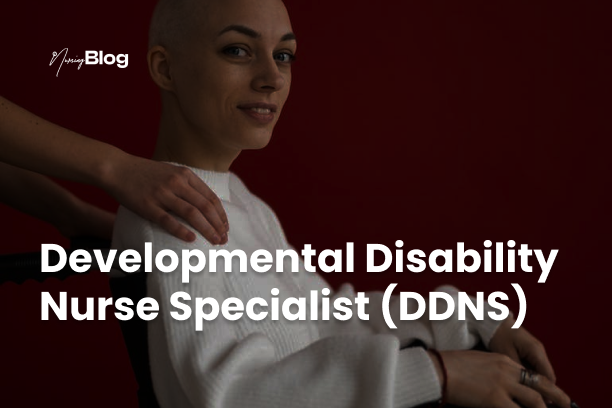Developmental Disability Nurse Specialist (DDNS) Everything you should know
DDNS stands for Developmental Disability Nurse Specialist. They are registered nurses (RNs) who have specialized training in the care of individuals with developmental disabilities. This includes conditions such as autism, cerebral palsy, Down syndrome, and intellectual disabilities.
Developmental Disability Nurse Specialist
DDNs work in a variety of settings, including hospitals, clinics, schools, and residential facilities. They provide a range of services, such as:
- Assessing and monitoring patient health
- Developing and implementing care plans
- Providing education and support to patients and their families
- Advocating for patients’ rights
- Coordinating care with other healthcare professionals
DDNs must have a strong understanding of the physical, emotional, and social needs of individuals with developmental disabilities. They must also be able to work effectively with patients, families, and other healthcare professionals.
If you are interested in a career as a DDNS, you will need to complete a bachelor’s degree in nursing (BSN) and a master’s degree in nursing (MSN) with a concentration in developmental disabilities. Some programs also offer a Doctor of Nursing Practice (DNP) degree in developmental disabilities nursing.
After completing your degree, you will need to pass the National Council Licensure Examination for Registered Nurses (NCLEX-RN) and the Registered Nurses Examination for Developmental Disabilities and Mental Retardation (RN-DMN).
What do developmental disability nurses do?
Developmental disability nurses (DDNs) are registered nurses (RNs) who have specialized training in the care of individuals with developmental disabilities. This includes conditions such as autism, cerebral palsy, Down syndrome, and intellectual disabilities.
DDNs work in a variety of settings, including hospitals, clinics, schools, and residential facilities. They provide a range of services, such as:
- Assessing and monitoring patient health: DDNs assess the physical, emotional, and social health of their patients. They monitor their vital signs, track their medications, and provide preventive care.
- Developing and implementing care plans: DDNs develop and implement care plans for their patients. These plans include the goals of care, the interventions that will be used, and the outcomes that are expected.
- Providing education and support to patients and their families: DDNs provide education and support to patients and their families. They teach them about the patient’s condition, how to provide care, and how to advocate for their patient’s rights.
- Advocating for patients’ rights: DDNs advocate for the rights of their patients. They work to ensure that their patients have access to quality care and that their voices are heard.
- Coordinating care with other healthcare professionals: DDNs coordinate care with other healthcare professionals, such as doctors, therapists, and social workers. They ensure that all of the patient’s needs are being met.
Where do developmental disability nurses work?
Developmental disability nurses (DDNs) work in a variety of settings, including:
- Hospitals: DDNs in hospitals provide care to individuals with developmental disabilities who are admitted for acute medical problems. They may also work in the emergency room or in the pediatric unit.
- Clinics: DDNs in clinics provide preventive care and chronic disease management to individuals with developmental disabilities. They may also provide education and support to patients and their families.
- Schools: DDNs in schools provide care to students with developmental disabilities who attend regular or special education classes. They may also work with students on developing self-care skills and social skills.
- Residential facilities: DDNs in residential facilities provide 24/7 care to individuals with developmental disabilities who need a higher level of support. They may also work with families to develop discharge plans.
- Community organizations: DDNs in community organizations provide support and services to individuals with developmental disabilities and their families. They may work in advocacy organizations, respite care organizations, or organizations that provide employment services.
DDNs may also work in private practice, consulting with families and other healthcare professionals on the care of individuals with developmental disabilities.
The specific duties of a DDN will vary depending on the setting in which they work. However, all DDNs are responsible for providing high-quality care and support to individuals with developmental disabilities and their families. They also work to advocate for the rights of individuals with developmental disabilities and to promote their independence
READ ALSO: Best Nurses Uniform Style in Nigeria: What You Need Know
How do you become a developmental disability nurse?
Here are the steps on how to become a developmental disability nurse:
- Earn a bachelor’s degree in nursing (BSN). This is the minimum educational requirement for becoming a registered nurse (RN). A BSN program typically takes four years to complete.
- Pass the National Council Licensure Examination for Registered Nurses (NCLEX-RN). The NCLEX-RN is a standardized exam that all RNs must pass in order to be licensed to practice nursing.
- Gain experience working with individuals with developmental disabilities. This can be done through a variety of settings, such as hospitals, clinics, schools, or residential facilities.
- Earn a master’s degree in nursing (MSN) with a concentration in developmental disabilities. This is not a requirement for becoming a developmental disability nurse, but it can help you advance your career and gain more specialized knowledge.
- Pass the Registered Nurses Examination for Developmental Disabilities and Mental Retardation (RN-DMN). The RN-DMN is a certification exam that is offered by the American Association of Developmental Disabilities Nurses (AADD). This exam is not required for becoming a developmental disability nurse, but it can demonstrate your expertise in the field.
Once you have completed these steps, you will be qualified to work as a developmental disability nurse.
What are the salary and career outlooks for developmental disability nurses?
The median annual salary for developmental disability nurses (DDNs) was $76,930 in 2020, according to the U.S. Bureau of Labor Statistics (BLS). The top 10% of earners made more than $116,000, while the bottom 10% made less than $52,000.
The career outlook for DDNs is expected to grow much faster than average for all occupations, with an employment growth rate of 17% from 2020 to 2030. This growth is being driven by the increasing number of individuals with developmental disabilities, as well as the growing demand for specialized care for these individuals.
Conclusion
DDNs can work in a variety of settings, including hospitals, clinics, schools, and residential facilities. They may also work in private practice or as consultants. The specific duties of a DDN will vary depending on the setting in which they work, but they may include:
- Assessing and monitoring patient health
- Developing and implementing care plans
- Providing education and support to patients and their families
- Advocating for patients’ rights
- Coordinating care with other healthcare professionals
conclusion
Developmental Disability DDNs must have a strong understanding of the physical, emotional, and social needs of individuals with developmental disabilities. They must also be able to work effectively with patients, families, and other healthcare professionals.
If you are interested in a career in nursing and are passionate about helping individuals with developmental disabilities, then becoming a DDN may be a good option for you. The job outlook for DDNs is strong, and the salary is competitive.







